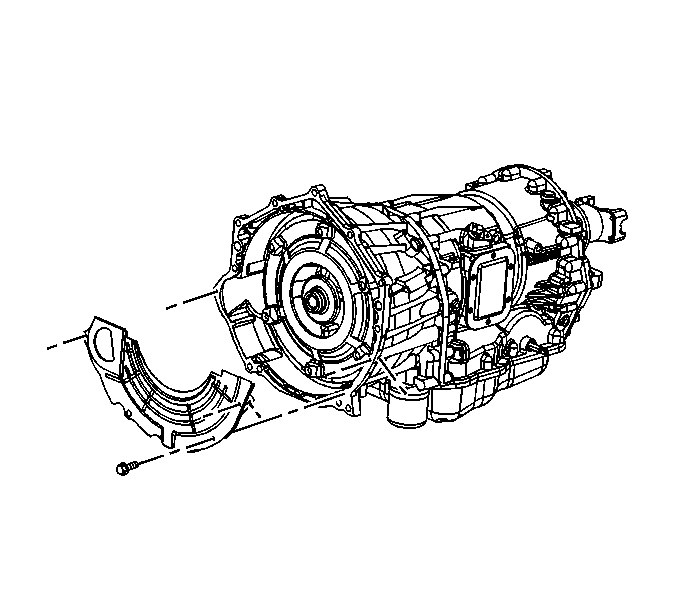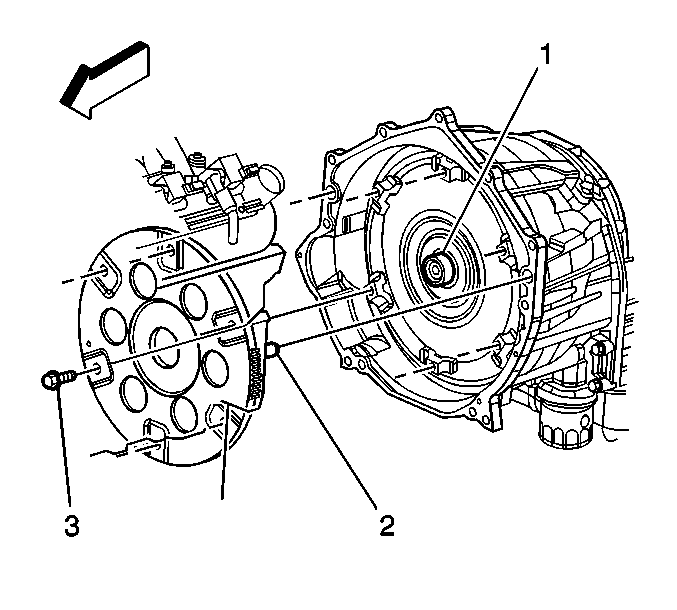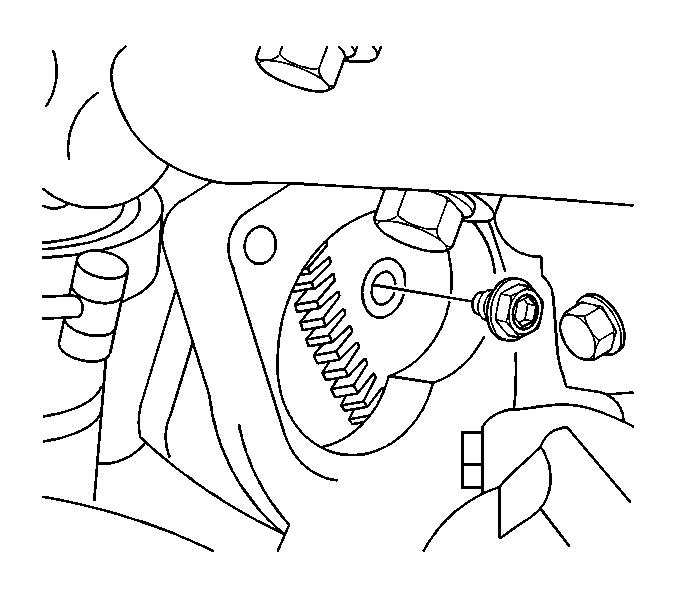Flex Plate/Torque Converter Vibration Test 8.1L
To determine and correct a torque converter vibration, use the following general
procedure to achieve the best possible torque converter-to-flywheel balance. Refer
to
Transmission Replacement
for detailed procedure
steps as appropriate.
Caution: Unless directed otherwise, the ignition and start switch must be in the OFF or LOCK position, and all electrical loads must be OFF before servicing
any electrical component. Disconnect the negative battery cable to prevent an electrical spark should a tool or equipment come in contact with an exposed electrical terminal. Failure to follow these precautions may result in personal injury and/or damage to
the vehicle or its components.
- Disconnect the battery.
- Raise the vehicle. Refer to
Lifting and Jacking the Vehicle
in General Information.
- Remove the starter motor bolts and position the starter motor aside. Refer
to
Starter Motor Replacement
in Engine Electrical.

- Remove the converter housing inspection
cover.
- Repeat this procedure until you obtain the best possible balance.
| • | Unless already removed, remove the starter motor bolts and position the
starter motor aside. Refer to
Starter Motor Replacement
in Engine Electrical. |

| • | Remove the torque converter bolts. |
| • | Rotate the torque converter one bolt position. |
Notice: Use the correct fastener in the correct location. Replacement fasteners
must be the correct part number for that application. Fasteners requiring
replacement or fasteners requiring the use of thread locking compound or sealant
are identified in the service procedure. Do not use paints, lubricants, or
corrosion inhibitors on fasteners or fastener joint surfaces unless specified.
These coatings affect fastener torque and joint clamping force and may damage
the fastener. Use the correct tightening sequence and specifications when
installing fasteners in order to avoid damage to parts and systems.
| • | Install the torque converter bolts. |
Tighten
Tighten the bolts to 60 N·m (44 lb ft).
Caution: Unless directed otherwise, the ignition and start switch must be in the OFF or LOCK position, and all electrical loads must be OFF before servicing
any electrical component. Disconnect the negative battery cable to prevent an electrical spark should a tool or equipment come in contact with an exposed electrical terminal. Failure to follow these precautions may result in personal injury and/or damage to
the vehicle or its components.
| • | Start the vehicle and test for vibration again. |
Caution: Unless directed otherwise, the ignition and start switch must be in the OFF or LOCK position, and all electrical loads must be OFF before servicing
any electrical component. Disconnect the negative battery cable to prevent an electrical spark should a tool or equipment come in contact with an exposed electrical terminal. Failure to follow these precautions may result in personal injury and/or damage to
the vehicle or its components.
- Disconnect the battery.
- Raise the vehicle. Refer to
Lifting and Jacking the Vehicle
in General Information.
- Remove the starter motor bolts and position the starter motor aside. Refer
to
Starter Motor Replacement
in Engine Electrical.
- Install the converter housing inspection cover.
- Install the starter motor and starter motor bolts. Refer to
Starter Motor Replacement
in Engine Electrical.
- Lower the vehicle.
Caution: Unless directed otherwise, the ignition and start switch must be in the OFF or LOCK position, and all electrical loads must be OFF before servicing
any electrical component. Disconnect the negative battery cable to prevent an electrical spark should a tool or equipment come in contact with an exposed electrical terminal. Failure to follow these precautions may result in personal injury and/or damage to
the vehicle or its components.
- Connect the battery.
Flex Plate/Torque Converter Vibration Test 6.6L
To determine and correct a torque converter vibration, use the following general
procedure to achieve the best possible torque converter-to-flywheel balance. Refer
to
Transmission Replacement
for detailed procedure
steps.
Caution: Unless directed otherwise, the ignition and start switch must be in the OFF or LOCK position, and all electrical loads must be OFF before servicing
any electrical component. Disconnect the negative battery cable to prevent an electrical spark should a tool or equipment come in contact with an exposed electrical terminal. Failure to follow these precautions may result in personal injury and/or damage to
the vehicle or its components.
- Disconnect the battery.
- Raise the vehicle halfway. Refer to
Lifting and Jacking the Vehicle
in General Information.
- Remove the starter motor bolts and position the starter motor aside. Refer
to
Starter Motor Replacement
in Engine Electrical.
- Repeat this procedure until you obtain the best possible balance.
| • | Unless already removed, remove the starter motor bolts and position the
starter motor aside. Refer to
Starter Motor Replacement
in Engine Electrical. |

| • | Remove the torque converter bolts. |
| • | Rotate the torque converter one bolt position. |
Notice: Use the correct fastener in the correct location. Replacement fasteners
must be the correct part number for that application. Fasteners requiring
replacement or fasteners requiring the use of thread locking compound or sealant
are identified in the service procedure. Do not use paints, lubricants, or
corrosion inhibitors on fasteners or fastener joint surfaces unless specified.
These coatings affect fastener torque and joint clamping force and may damage
the fastener. Use the correct tightening sequence and specifications when
installing fasteners in order to avoid damage to parts and systems.
| • | Install the torque converter bolts. |
Tighten
Tighten the bolts to 60 N·m (44 lb ft).
Caution: Unless directed otherwise, the ignition and start switch must be in the OFF or LOCK position, and all electrical loads must be OFF before servicing
any electrical component. Disconnect the negative battery cable to prevent an electrical spark should a tool or equipment come in contact with an exposed electrical terminal. Failure to follow these precautions may result in personal injury and/or damage to
the vehicle or its components.
| • | Start the vehicle and test for vibration again. |



